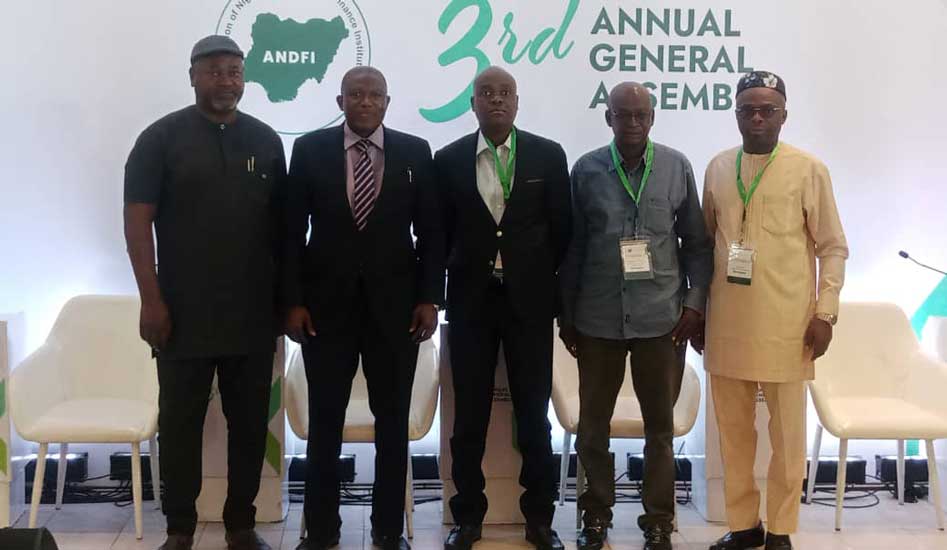How DFIs Can Bridge Financing Gap, Drive Transformative Changes–BoI MD
The Chairman of the Association of Nigerian Development Finance Institutions, Mr Olukayode Pitan has said that DFIs need fresh ideas, creative approaches, and collaborative efforts to bridge the financing gap and drive the transformative changes that Nigeria desperately needs.
Pitan said this on Thursday in Abuja at the 3rd Association of Nigerian Development Finance Institutions Annual General Assembly.
Advertisement
The event has is its theme, “Innovative Financing for Developmental Impact,” and was attended by stakeholders in the Development Finance sector of the Nigerian economy.
Pitan, who is the Managing Director, the Bank of Industry described the theme as Nigeria is currently home to an estimated 200 million citizens and is projected to experience the largest population growth in Africa by 2050 to about 400 million people.
He said as the country strives to achieve sustainable development goals and address global challenges, it has become increasingly clear that traditional financing models are inadequate.
Pitan said although innovative financing presents a veritable tool for DFIs to raise additional resources for development, specific market failures and institutional barriers prevent private investment from flowing to developing countries.
Advertisement
According to the BOI Boss, key challenges that have impacted development aspirations include asset deterioration, weak corporate governance and risk management frameworks, among others.
These issues, he noted, have also influenced the success and growth of DFIs and private sector players in the Nigerian economy.
He said, “We need fresh ideas, creative approaches, and collaborative efforts to bridge the financing gap and drive the transformative changes our country desperately needs.
“This is where innovative financing mechanisms that will complement traditional DFIs funding sources come to play. By utilizing specialized funding arrangements complemented by non-financial services, we as DFIs are able to act as growth catalysts to the development of the Nigerian economy.
“As we all know, DFIs play a significant role in ensuring sustainable economic and social development. This is evident in developed and developing economies where DFIs are instrumental to their economic successes.
Advertisement
“Therefore, we must continuously work together, leveraging on our expertise, resources, and networks to unlock transformative projects by working in synergy with the organized private sector and our respective Governments. Collectively, we can deliver the level of sustainable social and economic development that Africa needs.”
Speaking on the importance of international cooperation and solidarity in advancing innovative financing for developmental impacts, Pitan said developed countries can support developing countries by providing resources, technology transfer, and capacity building.
“Multilateral institutions therefore, have a critical role to play in coordinating efforts, mobilizing resources and ensuring the effective implementation of innovative financing mechanisms.
“Using the Bank of Industry as an example, over the years, we have successfully raised funds from the international capital market, which has allowed us to not only fill critical gaps and provide the necessary funding for transformative projects, but also exposed us to global best practices and innovative solutions that promote institutional development, and improve the effectiveness of developmental initiatives,” he added.
Speaking further, he told the gathering that since the Bank of Industry commenced its innovative financing mechanism, the total assets have grown significantly by 381 per cent between 2017 and 2023 (H1), reaching N2.38 trillion by the end of year 2022 and closing at N3.29 trillion as at June 2023.
According to him, the equity position has grown by 188 per cent from N220 billion in 2017 to N634 billion in 2023 (H1).
Advertisement
He added that the creation of quality risk assets has helped the bank to maintain a non-performing loan (NPL) rate of about 2% as at 2023 (H1).
This, he said, falls below the regulatory threshold of 5%.
Pitan said, “The bank maintains a strong corporate governance structure, its accounts are audited by one of the big 4 firms and it is rated by international and local rating agencies i.e. Fitch, Moody’s & Agusto & Co. In a nutshell, the benefits of innovative business initiatives cannot be overemphasized.
“To deepen our activities in innovative financing, we must foster mutual support and encourage cooperation among our members. This can be achieved through the exchange of technical expertise between our member DFIs and similar organizations globally.
“Likewise, we must prioritize the professional advancement of our members while leveraging on the knowledge from best-in-class economies that have adopted innovative financing initiatives.”
Similarly In his address, Banji Fehintola, Head of Treasury & Financial Institutions at Africa Finance Corporation (AFC) said DFIs in line with new developments and global practices must be innovative and more intentional about making impact.
“As DFIs we need to start thinking about diversifying our product offering the issue of having one solution for every problem needs to change we need to be innovative; and for us to be innovative, we need to invest in attracting the right people,” he said.
Highlighting focus areas for DFIs, he said they must think differently in solving problems and think of different types of equity instruments that can be introduced into the capital structure in order to attract different types of lenders that will support its capital base.
“As DFIs we need to focus on project development and think about how to support that capital base regularly as capital is a major pillar for our credit rating so we need to,” he said.



